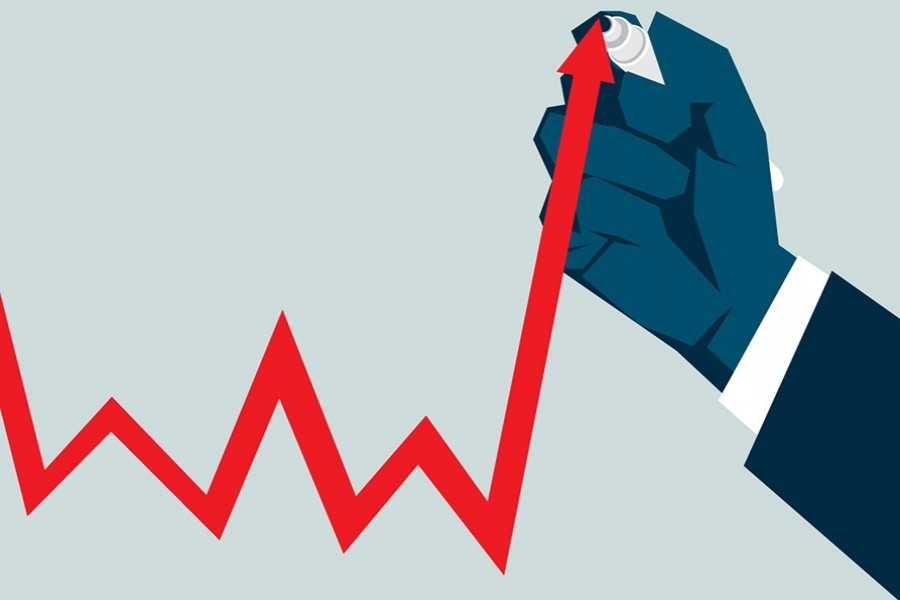That the rich the world over are becoming richer is no longer news. What, however, can cause eyebrows to raise is that there became as many as 3,400 new millionaires in Bangladesh within three months between April and June this year. In March the number of millionaires in the country was 82,625 and by June it increased to 86,037.
If such a large number of people joined the bandwagon of the rich in such a crunch time, what about the superrich of the country? On this count, Bangladesh has the enviable record of adding to its superrich list at the annual rate of 17 per cent -- highest in the world -- for five years from 2013-2017. According to the US-based research organisation Wealth X, the country's ultra-rich termed in economic lexicon High Net Worth (HNW) population were set to grow at the rate of 11.04 per cent for the next five years. Nigeria with 12 per cent was projected to be the front runner during this period with Egypt coming second and Bangladesh third.
However, this projection was made before the pandemic and there is no question of any calculation of the downturn the world economy and economies of individual countries are set to suffer on account of the epidemic. Certainly not all economies are going to be subjected to equal travails. Economies may suffer but about one thing a common rule prevails ---the rich are getting richer. Well, some of them may see a decline in their wealth and even a handful may become bankrupt, but the overall number of the rich is likely to grow if the common trend evident now in many countries including Bangladesh is any guide.
At a time when millions all across the planet are losing employment and means of livelihoods, the rich seem to be feasting on their miseries in order to accumulate more and more wealth. Let alone the humanitarian considerations and fellow feeling, the system of production and distribution of wealth has been irrationally structured by people commanding it. The history of industrialisation is witness to brutal exploitation of workers right from the day one at its cradle in England. Situation has changed over the decades and centuries but still it is inhumanly in favour of the white-collar employees and their owners. Add to this the intrigues and guiles that are brought to play an influential role in ensuring the lion's share of the market and returns on investment for the market players. Small wonder that tech giants Amazon, Apple, Google, Facebook had to appear before the US Congress for hearing on charges of irregularities aimed at killing competition from small enterprises.
In countries like Bangladesh where the avenues are open for the crafty and the notorious --- thanks to crony capitalism --- to become filthy rich, it is only natural that monopolisation of the market on this or that pretext often disrupts the approved and accepted economic norms and rules. So far as farm produces are concerned, middlemen and hoarders can have the cake and eat it too at the cost of farmers. In case of industrial goods, the diktat of the corporate houses including the multinational companies prevails. It is because of this, commodities like detergent, baby food etc; can register double or three times the introductory prices within months.
Price hike of such items does not much hurt the majority of the population who find themselves below the middle class. They have alternatives of inferior quality, with which they are forced to make do. This is one of the reasons why the standard of living of the mass people does not improve commensurate with the country's GDP growth. Inequality in society thus becomes endemic. Notwithstanding the pandemic, Bangladesh is set to achieve GDP growth at 3.8 per cent and overtake India in per capita GDP when many large economies are likely to record negative growth, according to the IMF.
However, the poor are not expected to receive any dividend. Instead, a large number of the retrenched workers are unlikely to get back their jobs. Actually, the catch 22 of the so-called free market economy or crony capitalism lies here. When production units incur losses or fail to profit on account of market slump, it is workers who become the first casualty. In a knee-jerk reaction to the early months' closedown, workers were furloughed or sacked all across the world. Industries can retain workers as long as their capital does not shrink to a precarious level. But do they? No wonder that starvation now stares in the face of 490,000,000 people globally. How many people in this country do face such a food crisis?
The poor's plight has been further aggravated by the volatility of market here. Common and poor people's main food items have registered outrageous price hike. How can the poor, many of whom have lost their jobs and livelihoods, survive when prices of vegetables, including potato have become double or three times the March-April price line?
True, cyclones in the southern coastal areas and repeated floods in the country's north and north-east have damaged standing crops and vegetables are short in supply. But there is no rationale behind the atrocious price rise of potato from just Tk 20 to 50 or 60 a kilogram. Procurement price was Tk10-15. To the syndicated price hike of rice and onion, potato has been added. Imagine the profit by hoarders at the rate of Tk 40-50 a kg of potato and onion, how long does one need to become a superrich? Unless this monopolised system of business and production is changed for rational sharing of return or profit, inequality will continue to grow to an extent where social upheavals cannot be ruled out.


